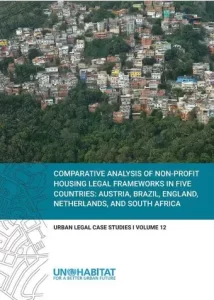COMPARATIVE ANALYSIS OF NON-PROFIT HOUSING LEGAL FRAMEWORKS IN FIVE COUNTRIES: AUSTRIA, BRAZIL, ENGLAND, NETHERLANDS, AND SOUTH AFRICA: URBAN LEGAL CASE STUDIES, VOLUME 12
More than 1.8 billion people worldwide lack adequate housing and the number of people living in informal settlements has passed a billion. Housing is a fundamental human right and UN-Habitat recognizes its catalyst role in the sustainable development agenda. ‘Housing at the centre’, a global approach set out by UN-Habitat in 2015, puts people and human rights at the foreground of sustainable urban development policies to leave no one and no place behind. A more coherent and comprehensive framework of affordable housing is necessary to ensure broad access to this necessity of life, one which facilitates cooperation across socio-economic backgrounds and creates shared interests in a safe community, a strong economy, and a vibrant social scene to harness the framework’s transformative potential.
The affordable housing solutions generated by the non-profit housing sector provide a novel framework for reforming affordable housing policy and legal frameworks. UN-Habitat has conducted a comparative analysis of the non-profit housing sector in five countries (Austria, Brazil, England, Netherlands, and South Africa), which serve as best practice legal frameworks for a robust and sustainable social housing sector. Through this assessment, UN-Habitat seeks to promote the participation of the non-profit sector in the provision of social housing to meet the demand for urban housing needs and to bridge the housing affordability gap.
This document is intended to not only help countries create or strengthen their legal frameworks to support the participation of non-profit organizations in the housing sector, but also proposes new governance frameworks to facilitate this. The primary purpose of this analysis is to provide a framework for the successful development, support, and sustenance of a non-profit housing sector in any country that seeks to adopt this approach to diversifying the housing stock. Naturally, its application depends on development priorities. To capitalize on the best practice available, a country checklist has been provided that will assist countries to conduct an internal assessment on its housing needs, existing policy and legal framework, and financial means which will provide systematic guidance for legislative, policy and institutional reform.
- Downloads 92
- Views 253
- File Size 29.2 MB
- Languages 1


